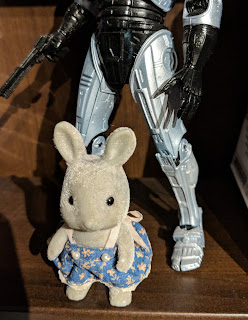The Man in the High Castle
Phillip K. Dick, 1962
Hugo Winner - 1963
Premise: It's 1962 in San Francisco. There are threats of war and planned Mars missions in the news, and the people of the Pacific States are uneasy. An art dealer, a government official, a machinist and others try to go about their daily lives. Most of these people are affected by two books: the I Ching, and a novel written by a reclusive author. In his novel, the world is different, and the characters are intrigued and disturbed by his vision of a world in which the Allies didn't lose World War Two.
I found this novel of alternate history to be enjoyable to read and intriguing to think about, although it didn't have much of a plot, per se. It is a highly meditative look at what life might have been like if Germany and Japan had split the world between them after World War II. The characters in the book hold widely divergent opinions on their governments, their history, and their hopes for the future. In 'The Grasshopper Lies Heavy' (the book-within-a-book), some see a dream of how life could have been, and others a warning of catastrophe that might have been; much the same things that readers in 1962 could have seen in The Man in the High Castle.
The characters' stories are interwoven gently: many only intersect each other's lives briefly or obliquely. Some are only concerned with their own livelihood, some are affected by world political affairs, while all of them contribute to the picture of life in this alternate timeline.
I was interested that in 1962, in America, Phillip K. Dick wrote about the hypothetical Japanese takeover with such a nuanced view. There is dissatisfaction, anger, and self-loathing from many of the American characters, but despite a few obviously horrible things – most notably, the re-institution of slavery – the government seems to run efficiently and with a surprising level of accommodation and care for the welfare of the conquered population. The Nazis, meanwhile, continue to be your normal crazy, evil, genocidal Nazis. It seems to be building toward war between the two new superpowers.
The book-within-a-book doesn't fully reflect our reality, but rather another version, in which some things are similar, and some things are different. It seemed early on to subscribe to a type of one-key-moment-causes-a-world-split timeline; the one key moment that is different in the two worlds is the assassination of FDR.
There are a series of little climaxes, some surprisingly action-packed, as the different characters resolve aspects of their stories. In one particularly interesting passage a character seems to briefly pass between worlds. The final climax of sorts is when one character actually meets the author of 'The Grasshopper Lies Heavy', but it mostly just continues the dreamlike quality of the whole work.
I enjoyed reading The Man in the High Castle, I thought the exploration of the alternate world was fascinating. Personally I prefer books with a bit more resolution, but this was a really interesting work.
4 Stars – A Very Good Book
List of Hugo Award Winners




Comments
Post a Comment
FYI: Most comments are moderated, and will not appear immediately.